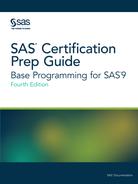Using Conditional Clauses with the Iterative DO Statement
Previous examples showed that the DO WHILE and DO UNTIL
statements enable you to execute statements conditionally and that
the iterative DO statement enables you to execute statements a set
number of times, unconditionally.
DO WHILE(expression); DO UNTIL(expression); DO index-variable=start TO stop BY increment;
In this DATA step, the
DO UNTIL statement determines how many years it takes (13) for an
investment to reach $50,000.
data work.invest;
do until(Capital>=50000);
Year+1;
capital+2000;
capital+capital*.10;
end;
run;Figure 15.5 SAS Data Set Work.Invest: Number of Years for an Investment
to Reach $50,000
Suppose you also want
to limit the number of years you invest your capital to 10 years.
You can add the UNTIL or WHILE expression to an iterative DO statement
to further control the number of iterations. This iterative DO statement
enables you to execute the DO loop until Capital is greater than or
equal to 50000 or until the DO loop executes 10 times, whichever occurs
first.
data work.invest; do year=1 to 10 until(Capital>=50000); capital+2000; capital+capital*.10; end; run;
Figure 15.6 SAS Data Set Work.Invest: Executing DO Loop until Capital >=$50,000
In this case, the DO
loop stops executing after 10 iterations, and the value of Capital
never reaches
50000. If you increase
the amount added to Capital each year to 4000, the DO loop stops executing
after the eighth iteration when the value of Capital exceeds 50000. data work.invest; do year=1 to 10 until(Capital>=50000); capital+4000; capital+capital*.10; end; run;
Figure 15.7 SAS Data Set Work.Invest: Increase Amount Added to Capital
Using a DO Loop
The UNTIL and WHILE
expressions in an iterative DO statement function similarly to the
DO UNTIL and DO WHILE statements. As shown in the following syntax,
both statements require a valid SAS expression that is enclosed in
parentheses.
DO index-variable=start TO stop BY increment UNTIL(expression);
DO index-variable=start TO stop BY increment WHILE(expression);
The UNTIL expression
is evaluated at the bottom of the DO loop. Therefore, the DO loop
always executes at least once. The WHILE expression is evaluated before
the execution of the DO loop. As a result, if the condition is initially
false, the DO loop never executes.
Last updated: January 10, 2018
..................Content has been hidden....................
You can't read the all page of ebook, please click here login for view all page.
